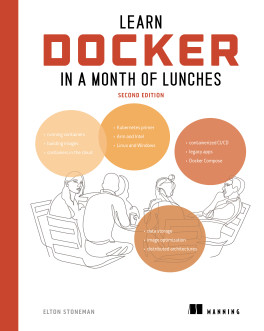pro $24.99 per month
- access to all Manning books, MEAPs, liveVideos, liveProjects, and audiobooks!
- choose one free eBook per month to keep
- exclusive 50% discount on all purchases
- renews monthly, pause or cancel renewal anytime
lite $19.99 per month
- access to all Manning books, including MEAPs!
team
5, 10 or 20 seats+ for your team - learn more

Look inside
Learn how and why to use Kubernetes to deploy projects of any size.
“Should we use Kubernetes?” This unique guide condenses 15 years of deployment experience to help answer that very question. It teaches you sustainable deployment practices you can use with any programming language and nearly any kind of modern app. You’ll create portable and containerized applications that can move across deployment options and cloud providers and see why Kubernetes is often the right choice for both small projects and big enterprise software.
Inside Road to Kubernetes you’ll learn how to:
“Should we use Kubernetes?” This unique guide condenses 15 years of deployment experience to help answer that very question. It teaches you sustainable deployment practices you can use with any programming language and nearly any kind of modern app. You’ll create portable and containerized applications that can move across deployment options and cloud providers and see why Kubernetes is often the right choice for both small projects and big enterprise software.
Inside Road to Kubernetes you’ll learn how to:
- Manage git repositories on self-hosted or cloud platforms like GitHub
- Deploy Python and Node.js apps via cloud-based virtual machines with git
- Automate virtual machine configuration and deployment with Ansible
- Containerize and deploy apps with Docker and Docker Compose
- Run containers on virtual machines without container orchestration
- Push and host containers with Docker Hub registry
- Deploy containerized apps on Kubernetes
- Implement public and private apps on Kubernetes
- Configure Kubernetes manifests for Pods, Deployments, Services, and more
- Provision and configure load balancers for HTTP & HTTPs traffic
- Use CI/CD techniques with GitHub Actions
- Deploy Docker Swarm and HashiCorp Nomad to run containers as alternatives to Kubernetes
If you’ve ever thought that Kubernetes was too complex for your deployment needs—think again! This one-of-a-kind guide answers all the deployment questions you might be asking, like “what is container orchestration”, “is Kubernetes right for simple deployments”, and “how can I reliably scale my containerized apps on the cloud”.
about the technology
Choosing Kubernetes as your deployment platform affects everything from application design to ongoing operations concerns like observability and security. Success depends on having all the facts before you start down the Kubernetes road. This book will guide you every step of the way so you can make informed choices about when, how, and why to choose Kubernetes for your next rollout.about the book
Road to Kubernetes provides a sophisticated framework for evaluating Kubernetes as an enterprise application deployment. You’ll learn the ins and outs of this powerful platform as you deploy a web application to a virtual machine, containerize it, and explore orchestration options. Along the way, you’ll automate build, test, and deploy using GitHub Actions and discover best practices that you can apply to nearly any stack. You’ll end up with a crystal-clear mental model of how to deploy, scale, and maintain applications on Kubernetes.what's inside
- Track versions and changes with Git
- Integration with GitHub Actions and Ansible
- Build containers including sample Python and Node.js apps
about the reader
Assumes familiarity with Python, JavaScript, and the Linux command line. No Kubernetes experience required.If you're looking to get hands-on with Kubernetes, this is your book. It solidified my understanding and made me a better engineer in the field.
choose your plan
team
monthly
annual
$49.99
$499.99
only $41.67 per month
- five seats for your team
- access to all Manning books, MEAPs, liveVideos, liveProjects, and audiobooks!
- choose another free product every time you renew
- choose twelve free products per year
- exclusive 50% discount on all purchases
- renews monthly, pause or cancel renewal anytime
- renews annually, pause or cancel renewal anytime
-
![]() Road to Kubernetes ebook for free
Road to Kubernetes ebook for free
choose your plan
team
monthly
annual
$49.99
$499.99
only $41.67 per month
- five seats for your team
- access to all Manning books, MEAPs, liveVideos, liveProjects, and audiobooks!
- choose another free product every time you renew
- choose twelve free products per year
- exclusive 50% discount on all purchases
- renews monthly, pause or cancel renewal anytime
- renews annually, pause or cancel renewal anytime
-
![]() Road to Kubernetes ebook for free
Road to Kubernetes ebook for free
















 Road to Kubernetes ebook for free
Road to Kubernetes ebook for free